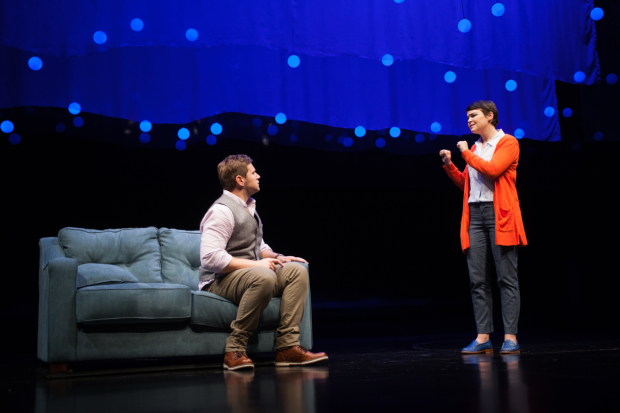Constellations
The audience is not allowed to turn their brains off for one minute during Nick Payne’s intricate comedy-drama.

(© Chris Whitaker)
Constellations, the character piece by Nick Payne that is now playing in a new production at the Geffen Playhouse, requires a talented cast to succeed. The expansive themes of love in an ever-expanding cosmos, the jarring sequencing of the moments, and their repetition could turn audiences off quickly. But director Giovanna Sardelli succeeds in her most challenging task of engaging the audience by hiring two adept performers who can handle the roles' complexities. Ginnifer Goodwin and Allen Leech connect emotionally with the audience, keeping the evening from feeling like a writing or acting exercise.
As a living embodiment of parallel-universe theories, a love story is told with numerous deviations so that each character's choice splinters off in diverse directions. Some facts remain the same: Marianne (Goodwin), a Cambridge professor, and Roland (Leech), a beekeeper, meet at a barbeque. She invites him back to his apartment that night. Marianne explains quantum physics and string theory to both Roland and the audience, declaring that the atoms and microbes of the quantum world care little about time or that string theory suggests that every decision we do or do not make takes us all in different directions. Altered versions of Marianne and Roland fail to spend the night, while others form a doomed relationship, broken up by infidelity, only to be rekindled before tragedy strikes.
Both actors, recognizable from famous television shows, he from Downton Abbey, she from Big Love and Once Upon a Time, have natural stage presence. Goodwin masters a perfect Oxbridge-educated London accent. Her presence, sometimes haughty, sometimes bubbly, creates a composite of a modern woman with so many choices that often lead to heartbreak. She capably conveys her convictions in scenes where her character cannot find the correct words (literally) or cannot speak at all. Leech has a difficult role, because in some variations he is physically and mentally abusive. That negativity carries over to his other alternative Rolands since the audience has seen that he has the capacity to lash out when cornered. So it is to Leech's credit that the audience accepts the violence brewing underneath and falls for his character when he chooses restraint and maturity. Both actors take sequences that are repeated two or three times and adds nuances to keep the audience intrigued.
Takeshi Kata's simple set of floating orbs that change color reflects the characters' mood effectively. The set rises from below or slides across so that the actors can be in constant motion from scene to scene.
Constellations asks quite a bit of its audience. The play is in unchronological order. Conversations splinter off into different variations, sometimes with only minor changes in dialogue or tone. The audience must piece together meanings, descramble non-linear timelines, and uncover the essence of jumbled conversations, providing an evening of difficult but engaging theater.









